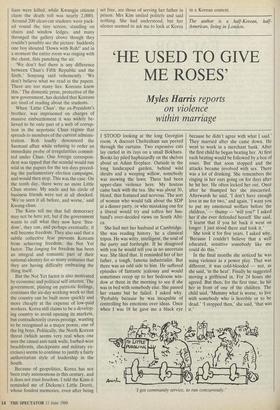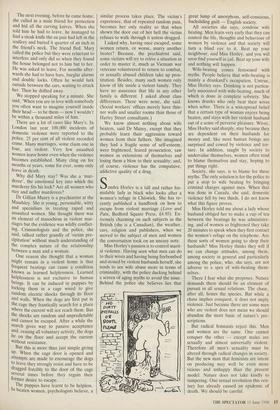'HE USED TO GIVE ME ROSES'
Myles Harris reports
on violence within marriage
I STOOD looking at the long Georgian room. A discreet Cheltenham sun peered through the curtains. Two expensive cats lay curled in its fays on a small Balchara. Books lay piled haphazardly on the shelves about an Adam fireplace. Outside in the long landscaped garden, behind wild shrubs and a weeping willow, somebody was mowing the lawn. There had been upper-class violence here. My hostess came back with the tea. She was about 30, blond, thin featured and nervous: The sort of woman who would talk about the SDP at a dinner party, or who mistaking one for a liberal would try and soften her hus- band's over-decided views on South Afri- ca.
She had met her husband at Cambridge. She was reading history, he a classical tripos. He was witty, intelligent, the soul of the party and forthright. If he disagreed with you he would tell you in no uncertain way. She liked that. It reminded her of her father, a tough, famous industrialist. But there was an odd side to him. He suffered episodes of fantastic jealousy and would sometimes creep up to her bedroom win- dow at three in the morning to see if she was in bed with somebody else. She passed her exams but he failed. I asked why. 'Probably because he was incapable of controlling his emotions over ideas. Once when I was 18 he gave me a black eye because he didn't agree with what I said.' They married after she came down. He went to work in a merchant bank. After the first child he began beating her. At first each beating would be followed by a box of roses. But that soon stopped and the attacks became involved with sex. There was a lot of drinking. She remembers the ringing in her ears going on for days after he hit her. He often locked her out. Once after he thumped her she miscarried. Afterwards he said, 'I don't have enough love in me for two,' and again, 'I Want you to put my emotional welfare before the children,' — thump — 'will you?' I asked her if she ever defended herself: She said, 'I learnt that if you hit back it went on longer. I just stood there and took it.'
She took it for five years. I asked why, 'Because I couldn't believe that a well educated, sensitive somebody like me could do this.'
In the final months she noticed he was using violence as a power play. That was different, it was cold-blooded — not, as she said, 'in the heat'. Finally he suggested moving a girlfriend in. For 24 hours she agreed. But then, for the first time, he hit her in front of one of the children. The child said, 'Mummy what is worse, to live with somebody who is horrible or to be dead.' I stopped then,' she said, 'that was it.'
1 got community service, to run concurrently.' The next evening, before he came home, she called in a male friend for protection and hid all the carving knives. When she told him he had to leave, he managed to find a steak knife the au pair had left in the scullery and buried it quarter of an inch in the friend's neck. The friend fled. Mary called the police but they were reluctant to interfere and only did so when they found the house belonged not to him but to her. He was asked to leave. For months after- wards she had to have bars, burglar alarms and double locks. Often he would lurk outside between the cars, waiting to attack her. Then he drifted away.
We stopped speaking for a minute. She said, 'When you are in love with somebody you often want to imagine yourself inside their head — to be them — now I wouldn't be within a thousand miles of him.'
There are a lot of cases like Mary's. In London last year 100,000 incidents of domestic violence were reported to the police, 25 per cent of all violent recorded crime. Many marriages, some claim one in four, are violent. Very few assaulted women leave home even when the violence becomes established. Many cling on for months or years, some for ever, some only leave in death.
Why did Mary stay? Was she a `mur- deree', the emotional key into which the murderer fits his lock? Are all women who stay and suffer murderees?
Dr Gillian Mazey is a psychiatrist at the Maudsley. She is young, personable, witty and specialises in treating raped and assaulted women. She thought there was an element of masochism in violent mar- riages but the evidence was wildly conflict- ing. Criminologists and the police, she said, talked rather grandly of 'victim pre- cipitation' without much understanding of the complex nature of the relationship between a man and a woman.
One reason she thought that a woman might remain in a violent home is that frequent beatings can cause a condition known as learned helplessness. Learned helplessness is not exclusive to human beings. It can be induced in puppies by locking them in a cage wired to give random electric shocks through its floor and walls. When the dogs are first put in the cage they frantically search for a place Where the current will not reach them. But the shocks are random and unpredictable and cannot be escaped. After a while the search gives way to passive acceptance and, ceasing all voluntary activity, the dogs lie on the floor and accept the current without resistance.
But this is more than just simple giving UP. When the cage door is opened and attempts are made to encourage the dogs to leave they strongly resist and have to be dragged forcibly to the door of the cage several times before they regain their former desire to escape. The puppies have learnt to be helpless. In beaten women, psychologists believe, a similar process takes place. The victim's experience, that of repeated random pain, becomes her only reality so that when shown the door out of her hell the victim refuses to walk through it unless dragged.
I asked why, having once escaped, some women return, or worse, marry another beater? Because, the psychiatrist said, some victims will try to relive a situation in order to master it, much as Vietnam war veterans volunteered to return to combat, or sexually abused children take up pros- titution. Besides, many such women only know of life inside a violent family. They have no assurance that life in any other family is different. I asked about class differences. There were none, she said. (Social workers' offices merely have thin- ner walls and smaller rooms than those of Harley Street consultants.) We know almost nothing about wife beaters, said Dr Mazey, except that they probably learn their aggression toward women from their fathers. She imagined they had a fragile sense of self-esteem, were frightened, feared prosecution, saw women as extensions of themselves and losing them a blow to their sexuality; and, of course, violence has the compulsive, addictive quality of a drug.
Sandra Horley is a tall and rather for- midable lady in black who looks after a women's refuge in Chiswick. She has re- cently published a handbook on how to escape from violent marriage (Love and Pain, Bedford Square Press, £4.95). Ex- tremely charming on such subjects as the British (she is a Canadian), the weather, cars, religion and publishers, when we moved to the subject of men and women the conversation took on an uneasy note.
Miss Horley's passion is to control marit- al violence. Having seen what men can do to their wives and having being firebombed and stoned by violent husbands herself, she tends to see wife abuse more in terms of criminality, with the police ducking behind a screen of aging myths to avoid the issue. Behind the police she believes lies tha great lump of amorphous, self-conscious, backsliding guilt — English society.
All societies she says, condone wife beating. Men learn very early that they can control the life, thoughts and behaviour of women by violence and that society will turn a blind eye to it. Beat up your neighbour, said Miss Horley, and you will soon find yourself in jail. Beat up your wife and nothing will happen.
Wife-beating comes festooned with myths. People believe that wife-beating is mainly a drunkard's occupation. Untrue, Miss Horley says. Drinking is not particu- larly associated with wife-beating, much of which is done in complete sobriety. She knows drunks who only beat their wives when sober. There is a widespread belief that a certain type of woman enjoys being beaten, and stays with her violent husband out of a sense of perverse pleasure. Wives, Miss Horley said sharply, stay because they are dependent on their husbands for money and, like most human beings are surprised and cowed by violence and tor- ture. In addition, taught by society to undervalue themselves, women often tend to blame themselves and stay, hoping to put things right.
Society, she says, is to blame for these myths. The only solution is for the police to put a stop to wife beating by bringing criminal charges against men. When that was done in Canada, she said, domestic violence fell by two thirds. I do not know what this figure ptoves.
Miss Horley told me about a lady whose husband obliged her to make a cup of tea between the beatings he was administer- ing, and of women so frightened they take 20 minutes to speak when they first contact the women's refuge on the telephone. Are these sorts of women going to shop their husbands? Miss Horley thinks they will if we can change attitudes, among them, among society in general and particularly among the police, who, she says, are not adverse to a spot of wife-beating them- selves.
There I fear what she proposes. Nature demands there should be an element of pursuit in all sexual relations. The chase, after all, hones the species. But while a chase implies conquest, it does not imply violence. Just because there are some men who are violent does not mean we should abandon the most basic of nature's pre- scriptions.
But radical feminists reject this. Men and women are the same. One cannot conquer the other — except males are sexually and almost universally violent. Therefore all men's sexuality must be altered through radical changes in society. But the new man that feminists are intent on producing may well be even more vicious and unhappy than the present model. Nature does not take kindly to tampering. One sexual revolution this cen- tury has already caused an epidemic of death. We should be careful.



































































 Previous page
Previous page